Warrenville bridges a rich history with contemporary suburban living.
Dave Oberhelman/doberhelman@dailyherald.com
Many of Warrenville's more than 13,000 residents choose to work right in the city.
Who could blame them?
Warrenville is safe, offers a pleasing combination of rich history and contemporary business, entertainment and hospitality facilities and is either bordered by or contains five forest preserves, a factor in the National Arbor Day Foundation designating the town as a Tree City USA honoree 25 times.
Settled in 1833 and incorporated in 1967 on what the Forest Preserve District of DuPage County said had earlier been Potawatomi territory, Warrenville's early years were formed by former New Yorker Julius Warren, who earned the title of "The Colonel" for his community leadership that included surveying, industry and development, and even delivering mail to the fledgling city.
We recently spent some time exploring Warrenville, taking photographs of some well-known and not-so-well-known spots.
Look for a new "Icons of ..." town gallery every Sunday at dailyherald.com/galleries and on Instagram, Facebook and Twitter. On our social media sites, share your favorite Warrenville photos with us by using #shareyoursuburb.
And tell us what photos are your favorites. Which ones stir a memory for you? Where do you love to go in town?
The oldest frame house in DuPage County, this is Warrenville founder Julius Warren's house, 28W310 Main St. Built in 1834, it is the oldest of the 17 locations identified by the Warrenville Historical Society's Bronze Plaque Program. It has been expanded but remains two stories as it did in Warren's day. It also served as Warrenville's first post office, since Warren served as the town's first postmaster. The current owners have retained the original wood flooring and have retrofitted some of the building's original doors, including using one door as a kitchen island. Other items found on the property, including original wooden beams with tree bark intact, are used as accents.
Dave Oberhelman/doberhelman@dailyherald.com
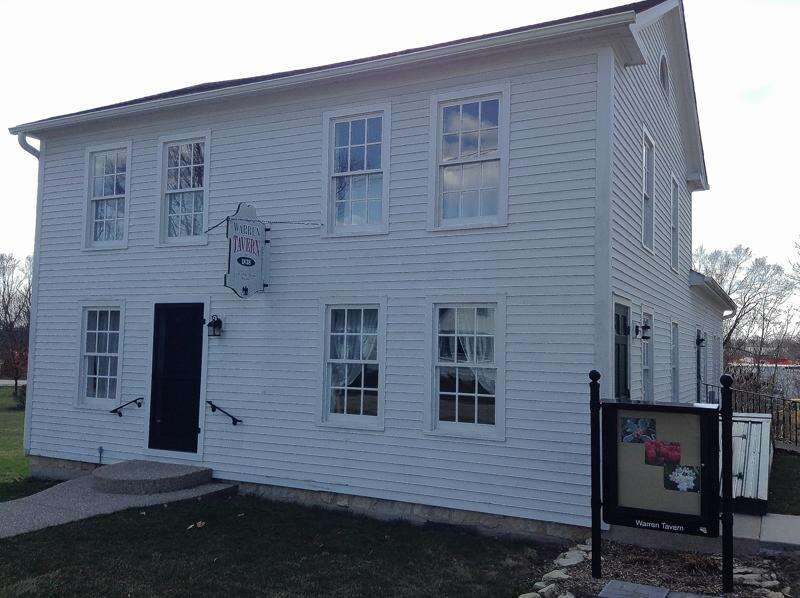
The Warren Tavern Museum, 3S540 Second St., was built by Warrenville founder "Colonel" Julius Warren as a hotel in 1838. Originally located at the corner of Winfield and Warrenville roads (now a Walgreens), the tavern was headed for demolition in 1991 before a group of volunteers called the Warren Tavern Preservationists successfully moved the structure to its present site in 1992, according to the Warrenville Historical Society. The Preservationists continue to maintain the building, which is available for rental for small social gatherings.
Dave Oberhelman/doberhelman@dailyherald.com
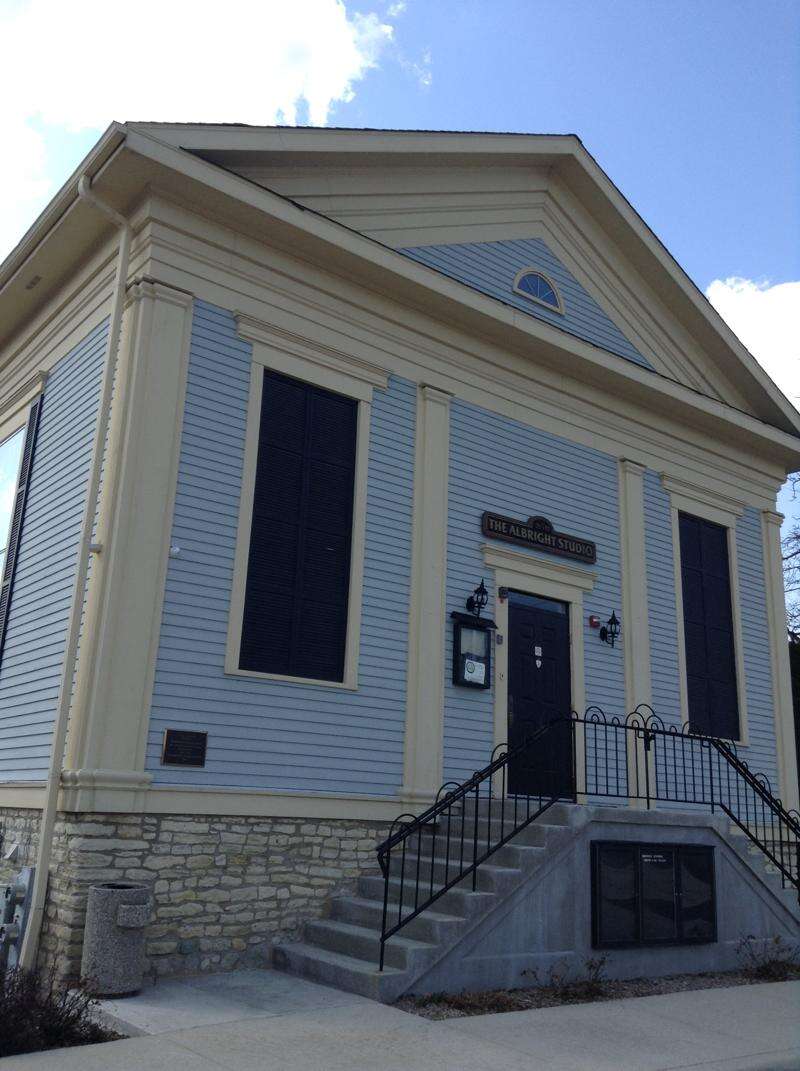
The Albright Studio, 3S530 Second Street, was built in 1858 originally as a Methodist church for a 17-member congregation, according to journalist Mary Curtis. Over time it became a school, a social club and, in 1924, the studio of Adam Emory Albright and twin sons Ivan and Malvin. After housing other cultural ventures, the city acquired the structure in 1981, the Warrenville website states. It is currently maintained as a museum by the Warrenville Historical Society.
Dave Oberhelman/doberhelman@dailyherald.com
These plaques at the intersection of Main and Second streets note that in 1844 Julius Warren recorded the plat of what is now known as Warrenville's Historic Area. A Bronze Plaque Program initiated in 1982 under a city Historical Sites Commission identified a total of 17 structures or historic sites that predated 1866. Fifteen are still standing.
Dave Oberhelman/doberhelman@dailyherald.com
Located on the northern side of Warrenville Road between Warren and Curtis avenues, city information notes the Warrenville Cemetery was incorporated by the state legislature in 1845. The 5-acre site, which for the past eight years has hosted tours in October by the Warrenville Historical Society, contains grave sites of many prominent Warrenville citizens.
Dave Oberhelman/doberhelman@dailyherald.com
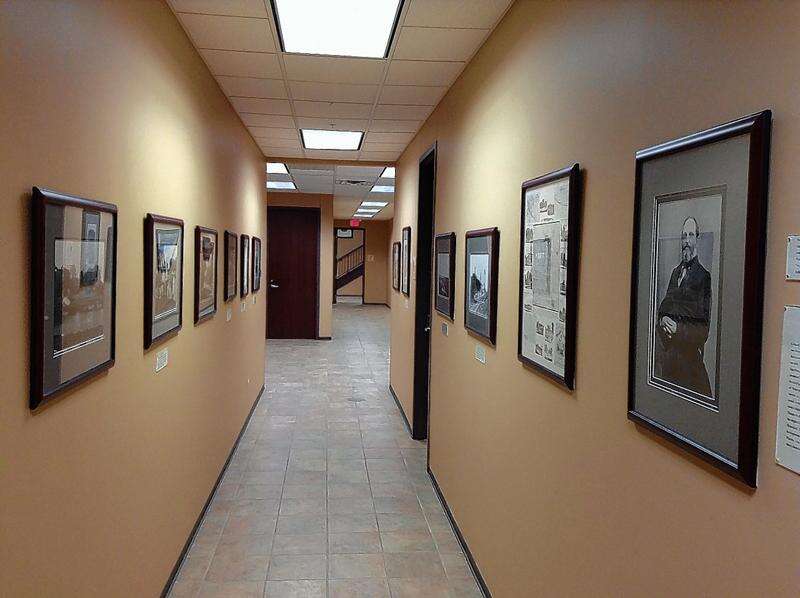
The Leone Schmidt Hall of History at City Hall, 28W701 Stafford Place, contains maps, photos and documents pertaining to Warrenville's history - including photos of founder "Colonel" Julius Warren and the city's first mayor (1967-77), Bill Stafford. In 2001 the collection was named after officially decreed City Historian Leone Schmidt, a prolific writer of the town's history and first curator of the Warrenville Historical Museum. The city notes that in 1991 the Illinois State Historical Society named Schmidt a "friend of history," and she was the first recipient of the Studs Terkel Humanitarian Service Award by the Illinois Humanities Council. A city park named for Leone Schmidt stands at Warrenville Road and Second Street next to the Warren Tavern, which Schmidt helped preserve.
Dave Oberhelman/doberhelman@dailyherald.com
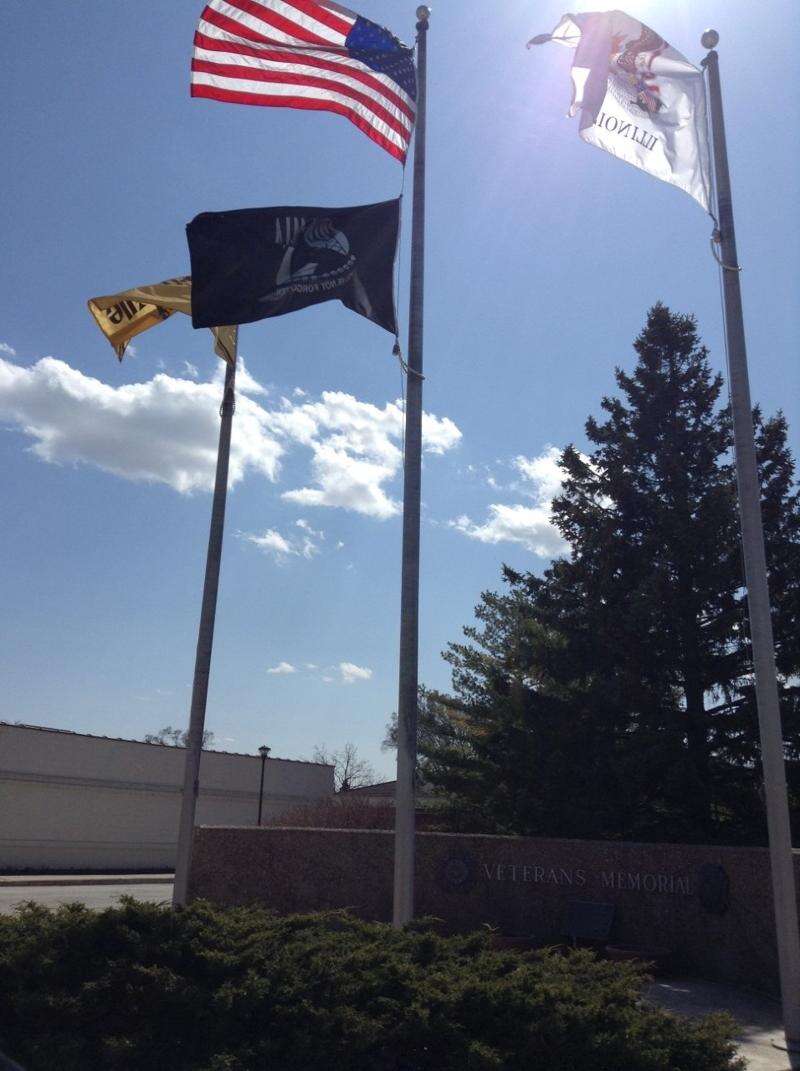
The Warrenville Veterans Memorial, at the intersection of Stafford Place and Warren Avenue at the entrance to the Civic Center, hosts annual Memorial Day celebrations. Dedicated in 1984 and rededicated in 1986, the site holds several of the "honorary stones" that are located throughout the town and memorializes Warrenville residents who lost their lives in wartime.
Dave Oberhelman/doberhelman@dailyherald.com
Among many plaques honoring Warrenville's casualties of war to be found at the Veterans Memorial outside the Stafford Place entrance to City Hall, this one salutes local World War I soldiers.
Dave Oberhelman/doberhelman@dailyherald.com
A pair of familiar local establishments - Al's Pizza and Towne Tap - share this building at Warrenville and River roads. These are places where, among regulars, everyone would know their names.
Dave Oberhelman/doberhelman@dailyherald.com
Al's Pizza manager Justin Mason prepares the local institution's signature dish. A third-generation family business established in 1959, Mason said little has changed aside from "a couple employees" and the installation of color televisions. "If it ain't broke," he said, "don't fix it."
Dave Oberhelman/doberhelman@dailyherald.com
The Towne Tap, 28W247 Warrenville Rd., was founded in 1965 at its present location. Its origins date decades before to Paul's Tavern on the other side of adjacent River Road. Art Burgess took over in 1965 and current owner, daughter Lynn Burgess, succeeded him in 1990.
Dave Oberhelman/doberhelman@dailyherald.com
Initially conducting worship services in a Warrenville community center in 1942, after several years Trinity Lutheran Church was built on the corner of Warrenville Road and Curtis Avenue, church information states. Trinity Lutheran is among 10 churches in town, catering to a variety of denominations.
Dave Oberhelman/doberhelman@dailyherald.com
This corn "crib" is among many nifty items at St. James Farm Forest Preserve, a 618-acre refuge that has Winfield Road as its western border and extends north and south of Butterfield Road. The farm dates back to at least the 1890s, according to the DuPage County Forest Preserve District. After 1920 the initial 203 acres changed hands to relatives of Cyrus McCormick, the inventor who founded the company that became International Harvester. Today St. James Farm offers 1.6 miles of trails, artwork, fishing and many plant and animal species in addition to several 1800-era farmstead structures.
Dave Oberhelman/doberhelman@dailyherald.com
The West Branch of the DuPage River winds through Blackwell Forest Preserve and Warrenville Grove Forest Preserve before coursing through downtown Warrenville then on into McDowell Grove Forest Preserve.
Dave Oberhelman/doberhelman@dailyherald.com
McDowell Grove Forest Preserve lists Naperville as its location, but it borders Warrenville at Diehl Road and Raymond Drive on the south side of town. According to the Forest Preserve District of DuPage County, the site initially was a camp for the Civilian Conservation Corps under President Franklin D. Roosevelt's New Deal program. Today the 465-acre McDowell Grove offers 6 miles of trails through woodlands, fields, a floodplain forest and the ever-present Western Branch DuPage River.
Dave Oberhelman/doberhelman@dailyherald.com
Formed in part by a retreating glacier, Blackwell Forest Preserve, with its Butterfield Road entrance, offers a variety of activities and habitats within its 1,379 acres. The Forest Preserve District of DuPage County named it after a former district President Roy C. Blackwell.
Dave Oberhelman/doberhelman@dailyherald.com
Cerny Park, at River Road and Forestview Avenue South, is among several parks throughout the city that offer playground equipment and other amenities. Cerny Park hosts an annual, daylong Fourth of July celebration including a parade, games and fireworks.
Dave Oberhelman/doberhelman@dailyherald.com
Located in the town's Civic Center that includes City Hall and the Warrenville Public Library, on Stafford Place southwest of the intersection of Butterfield and Batavia roads, this bronze sculpture helped commemorate the city's 175th anniversary. The Albright Gazebo is seen in the background.
Dave Oberhelman/doberhelman@dailyherald.com
The Warrenville Park District touts Summerlakes Park, 3S010 Talbot Ave., as the city's largest park at 28 acres. Located near the town's western border, Summerlakes Park offers areas for baseball, softball, soccer and tennis, as well as open areas and wetlands. It also has the only pool available at a Warrenville park, but the pool is available only to Summerlakes residents.
Dave Oberhelman/doberhelman@dailyherald.com
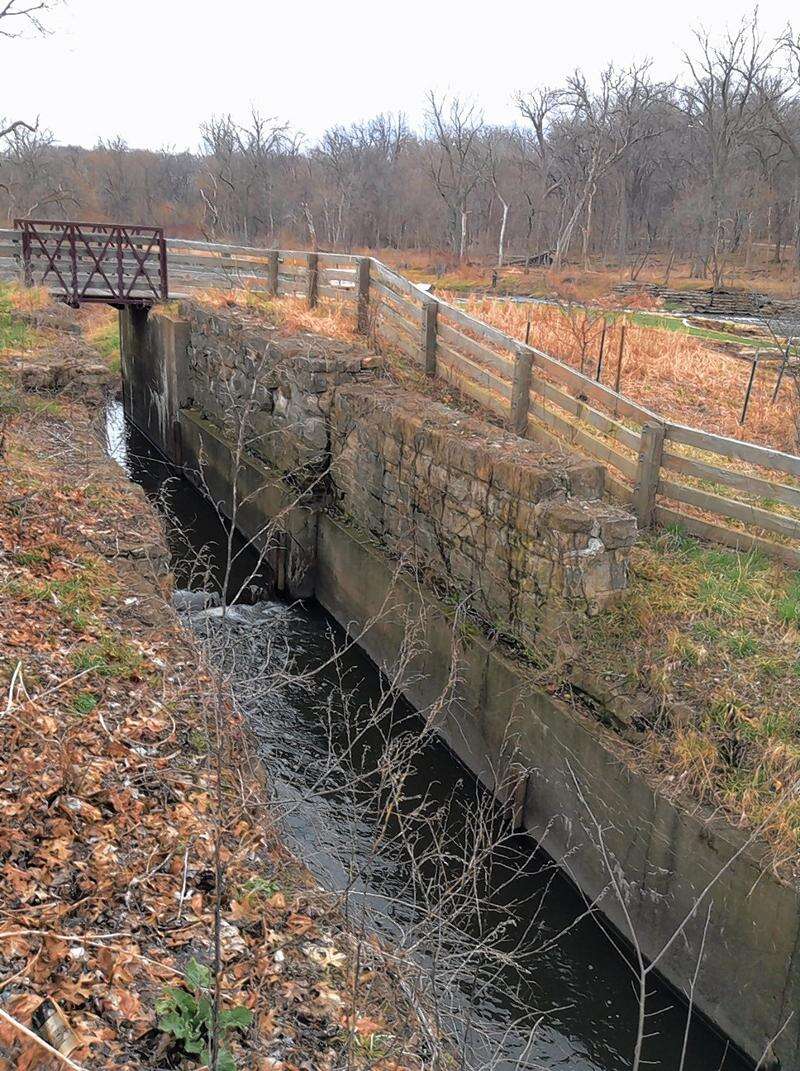
This man-made channel, or "raceway," off the West Branch DuPage River welcomes visitors to the Warrenville Grove Forest Preserve as entered via Batavia Road north of Warrenville Road. The Grove is a 131-acre park providing fens, floodplain and woodlands, but the significance of the channel runs deep in Warrenville history. The water that runs through it once powered a "grist mill" (grist being corn, rye, wheat, etc.) that was used between 1847-87, according to the Forest Preserve District. Not just an economic center, places such as Warrenville Roller Mills (another was Gary's Mill once located in the current Blackwell Forest Preserve) were so busy farmers waited hours to get their product tended to, and so served as social centers as well.
Dave Oberhelman/doberhelman@dailyherald.com

The Cantera complex includes dining and entertainment options including the Regal Cantera Stadium 17 & RPX theater and the adjacent Main Event, each bordered by Winfield and Diehl roads. Formerly a 650-acre depleted limestone quarry (its Spanish translation is "cantera"), the City of Warrenville notes that when the development was first established as a tax-increment financing (TIF) district in 1986 the area contributed $7,347 in annual property taxes. In 2009, the city states, it contributed $9.5 million in property taxes.
Dave Oberhelman/doberhelman@dailyherald.com
Founded in 1998 in Plano, Texas, but opened in Warrenville only recently, Main Event Entertainment offers bowling, laser tag, billiards, a ropes course and other games as well as food and drink.
Dave Oberhelman/doberhelman@dailyherald.com
Warrenville is always moving forward. The reconstruction of the Warrenville Road Bridge over the West Branch DuPage River, built in 1983, is an example of that.
Dave Oberhelman/doberhelman@dailyherald.com
Bordered by the more populated Naperville and Wheaton, Warrenville's history, economy and culture stands on its own.
Dave Oberhelman/doberhelman@dailyherald.com